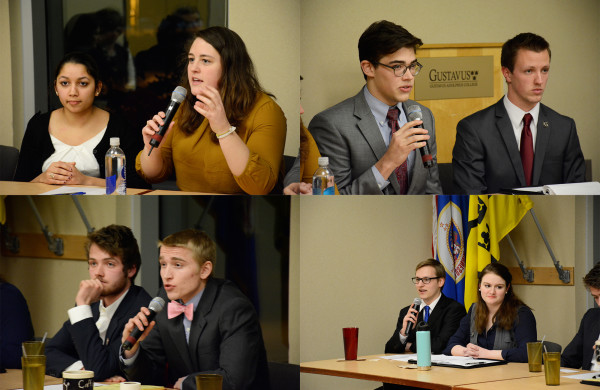Candidates for the Co-Presidency of Student Senate met in the St. Peter Room for a short debate on Tuesday, Feb. 24.
The conversation began with questions prepared by Co-Presidents Matt Timmons and Hayden Goldstien. Candidates were given one minute to respond to questions aimed towards elaborating what their goals for Student Senate would be.
“We’ve both been on senate for 2 years and we see how it can be improved in the day to day operations,” Junior English and Political Science Major Delaney Sweet said. “We hear your concerns and the changes you want to make. We see how to make not only the Senate better, but the overall student experience at Gustavus.”
Sweet is running alongside Sophomore Biology Major Herchran Singh. They have focused their campaign on representing all parts of the Gustavus community.
“One of the largest issues that we face is regarding equity,” Singh said. “On our platform, we want to ensure that each student’s voice on campus is represented in an equitable manner. We want to educate, inspire and empower all of the students at Gustavus.”
While Sweet and Singh noted they offer diverse perspectives compared to the other Co-Presidential candidates, some were quick to acknowledge their inability to offer such points of view.
“We have experience working with administrative entities and student organizations to get things done. We operate with a broad variety of involvement and perspectives on campus,” Junior History Major Sam Panzer said. “As straight white men, we’re operating with an awareness of the lack of perspectives we carry and the drive to make sure those perspectives are represented on the senate floor.”
Joining Panzer in his campaign is Junior Public Accounting Major Bobby Rasmussen. “The biggest part of our platform is getting a lot of students involved,” Rasmussen said. “If we want to be the voice, then we need to hear the voices of our constituents. In the end, we won’t decide what gets done. It will be the student senate body who decides what passes and what does not.”
“The biggest part of our platform is getting a lot of students involved. If we want to be the voice, then we need to hear the voices of our constituents.”—Bobby Rasmussen
Panzer and Rasmussen focused on who decides which projects will be undertaken by Student Senate. Other candidates concentrated on the process of achieving the chosen goals.
“Any great leader knows he won’t be able to accomplish all of their great ideas,” First-year Jake Kmiech said. “The best way to get that done is to decide which ideas we think are the most important and go through things more slowly and carefully.”
Kmiech is campaigning with First-Year Taylor Wicklund. While it is unconventional for first-years to run in this election, Kmiech and Wicklund are confident first-year candidates.
“We think our voice is very unique, having not been through Senate for as many years and not being comfortable with the way Senate is run,” Wicklund said. “The conversation has started about how to make Senate more accessible. We’d like to focus on that in our co-presidency.”
Wicklund offered an idea to change the ways the Senate interacts with the student body.
“We really want to see Senators with office hours outside of the Caf. We would like to see at least one hour every school day during a busy time. It would allow students and senators to actually interact. It’s not your job to come to us. We want to come to you.”
Along with accessibility and public relations, the idea of transparency within the actions taken by Student Senate was an issue addressed by almost every candidate.
“The biggest issues we want to take care of are transparency and accessibility of Student Senate to the general population,” Junior Philosophy Major Sean Kehren said. “We’re here to show that Gustavus has the potential to address our problems.”
Kehren and his running partner, Junior Political Science Major Reed Baillie, offered ideas to address these concerns.
“We want to broadcast a live video feed of the senate meetings,” Baillie said. “What we currently have in place with the minutes being published is clearly not helpful since transparency is being recognized as such a big issue.”
Following the questions posed by Timmons and Goldstien, those in attendance were able to ask questions of their own. The candidates were given another minute to answer these queries.
One topic raised was Female Power Hour and sexism on campus. Female Power Hour refers to an hour daily period when the weight room is reserved solely for students identifying as female.
“The biggest issues we want to take care of are transparency and accessibility of Student Senate to the general population.”—Sean Kehren
“This is a huge issue on campus,” Singh noted. “As women, we can represent you in that and we think that the issue needs to be solved. Female Power Hour is a good way to address that, and we support it.”
Singh and Sweet are the only pairing of women running for the Co-Presidency. Those running against them also showed an interest in the concerns of female students on campus.
“We feel that the formal address of sexual assault and sexual inequality by Student Senate is incredibly important,” Kehren said. “The weight room should be a place for everyone. Possibly, we could have some sort of address or group where people could talk about their experiences. Since we’re both men, we haven’t experienced this. We’re open to suggestions as to how to address it.”
Throughout the debate, the candidates all mentioned that they would like themselves and all Senators to become better representatives of the student body. Rasmussen and Panzer clarified the role they wish to play in bringing that desire to fruition.
“We want to serve as a mediator,” Rasmussen said. “We’re here to get your ideas, listen to you, and set those ideas in motion.”
Voting begins on Monday, March 2 at 9:30 a.m. and ends at 10:00 p.m. the same day.
-Kaity Young
